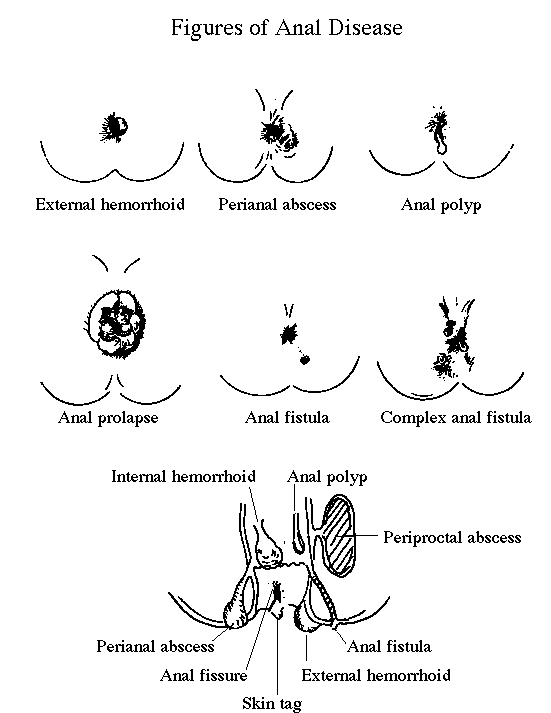
There are various conditions in hemorrhoids. For example, the complaint may be "an especially strong ache", "bleeding, although the ache is not strong", "anal prolapse at the time of defecation", "itching", "the circumference of the anus is damp continuously", "pus is coming out".
[1] Ache
Regarding generation of sustained intense pain, acute inflammation and, acute perianal abscess formation need to be considered. On the other hand, with on ache at the time of defecation, an anal fissure may be involved. Moreover, thrombotic external hemorrhoids can occur, when a round fleshy mass is present at the anus.
[2] Bleeding
With anal bleeding at the time of defecation, internal hemorrhoids can be considered, along with anal prolapse. In addition, colon cancer and various other illnesses of the colon may also cause bleeding.
[3] Pus
An anal fistula may be present, when continuous dampness is experienced with pus discharge.
[4] Itchiness
Eczema and dermatitis of the circumference of the anus can result in itching, and if this is especially at night pinworms may be a cause. Alternatively diabetes, allergy, and in women, hormonal stimulation may be involved.
Many veins are gathered around the anus, forming a net-like mesh (rectum anus venous plexus). Congestion may easily occur within the plexus by various causes, and clots may form thrombi, internally or externally near the surface of the anus as hemorrhoids. This state is called incarcerated hemorrhoids. Moreover, cases may be experienced where two or more hemorrhoids arise and the whole anus escapes as anal prolapse.
If bacteria grow inside of the rectum, with inflammation and festering, this will generate heat and sharp pain will ensue. This condition is known as a pus accumulated perianal abscess. If tearing occurs recovery is difficult, and the state where a mass remains is called an anal fistula.
If there is an anal fissure and this is not cured, chronic ulcers may result.
Cure must be taken with bleeding
from the anus over a long period of time. Since there is danger of anemia, tiredness and loss of balance. In such a case, blood tests are essential
with appropriate necessary measuresfor control. Regarding diseases featuring blood in the
stool other than hemorrhoids, chronic ulcerative colitis, Crohn's disease, and
tumors need differential diagnosis. Although
most patients will be 40 years old or older, occasionally people in there 20fs
may also suffer. Moreover, since there
is tendency for rapid advance of cancer development in young people, it is
necessary for then to undergo medical treatment immediately.
